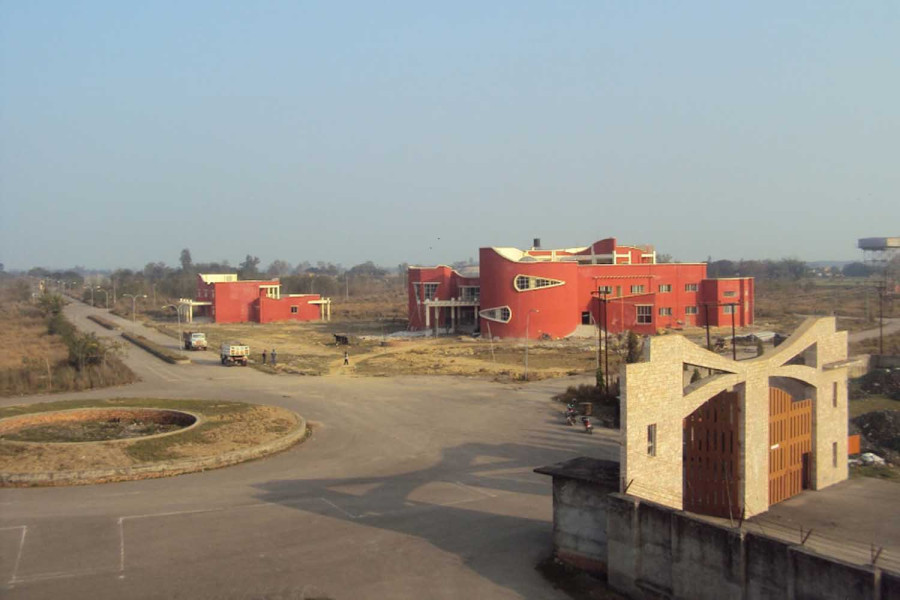Money
Firms at industrial estates to get rent discounts based on export performance
Companies in special economic zones that export more than 60 percent of their output will get higher reductions.
Madhav Dhungana & Krishana Prasain
The regulator of special economic zones has come up with a new plan to support the goal of boosting the country's exports.
Chandika Bhatta, executive director of the Special Economic Zone Authority, said rentals for firms in the industrial estates would be linked to their export performance—the more they export, the less rent they pay.
The government established special economic zones or export processing zones with the objective of attracting foreign and domestic investors to build factories and manufacture export products.
But instead of turning into an industrial powerhouse, the special economic zones became known more for their rows of vacant lots for failure to attract entrepreneurs.
In a bid to invigorate the sleepy industrial estates, the government had been urged to reduce the rent to entice firms to set up factories.
In March 2016, the Bhairahawa Special Economic Zone slashed the monthly rental charge from Rs150 per square metre to Rs20. But that still did not attract investors.
The Special Economic Zone Authority then considered halving the rent to Rs10 per square metre. But following the decision to implement the new policy, the basic rent will not be changed.
"The rental fee will remain at Rs20 per square metre," said Bhatta.
Under the proposed policy, the basic rental rate of Rs20 per square metre will apply to firms that export 60 percent of their production. Firms exporting more than 60 percent of their output will get progressively higher discounts.
A company that exports 100 percent of its production will get a 60 percent discount on its rent. It will pay Rs8 per square metre as rental fee.
“If we reduce the rent to Rs10 per square metre, industrialists will still say that it is too expensive, and may again ask for a reduction,” Bhatta said.
“If the fee reduction is based on performance, it will be a justifiable move. The new policy may take three-four months to come into implementation as we have to amend the existing law,” Bhatta said.
The Special Economic Zone Authority has also started discussions whether to allow tobacco and alcohol-related factories to be set up in the special economic zone in Bhairahawa.
Located in south central Nepal, the Bhairahawa Special Economic Zone contains 69 industrial plots ranging in size from 1,400 to 3,700 square metres.
Talks about permitting tobacco and alcohol factories have been going on for years, but there has been no outcome.
The Special Economic Zone Regulation forbids the establishment of factories making products like cigarette, tobacco, gutkha, beer, liquor and wine in the special zones.
"Excise duty is levied on tobacco and alcoholic products, and the government will lose revenue if there is an exemption on excise duty, income tax or VAT," Bhatta said.
“Although there have been discussions on the establishment of tobacco and alcohol related factories for the past three years, we are not in favour of allowing such manufacturers,” Bhatta said.
"Now, there are discussions whether such factories should be allowed inside the special economic zones as they will boost foreign exchange earnings and create employment. But the authority is totally against such plants," he said.
"The authority had rejected two applications from liquor and wine producers a month and a half ago," he said.
Investor Pawan Agrawal had asked the authority’s permission to operate a liquor factory in the special economic zone. Babai Agro Herbal Company had requested permission to produce wine by processing herbs in the special economic zone.
A board decision on June 10 rejected both applications.
"There are also discussions on whether or not to permit tobacco and alcohol industries to operate as the Industrial Act does not bar their operation," Bhatta said. “But we are of the view that if such factories are allowed to operate in the special economic zone, they should export 100 percent of their production.”
According to the provision, factories in the special economic zone do not need to export their products in the first year of operation, and are required to start exporting 60 percent of their output from the second year.
Firms in the special economic zone get a 100 percent waiver on income tax for five years and a 50 percent waiver for 25 years.
Similarly, factories operating in the special economic zone do not have to pay VAT and they get export subsidies too.
The country has two special economic zones currently in operation, and nearly a dozen others are under development.
Nepal plans to build four cross-border economic zones—two on the border with India and two on the northern border with China—as part of an effort to develop economic corridors to link the two immediate neighbours.
On the southern border, the special economic zones will be located in Dodhara-Chandani in Kanchanpur and Jogbani in Morang.
On the northern border, the special economic zones will be constructed in Kimathanka in Sankhuwasabha and Korala in Mustang, according to officials.




 22.12°C Kathmandu
22.12°C Kathmandu















